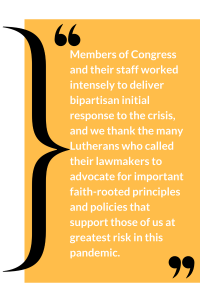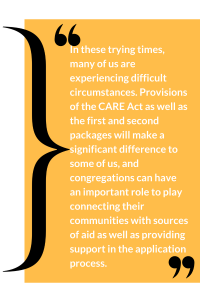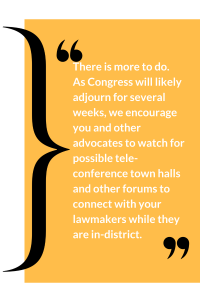 On March 27, Congress passed the Coronavirus Aid, Relief, and Economic Security Act, H.R. 748 (CARES Act), a third economic aid package to help bring direct relief to families, reinforce struggling industries and the healthcare sector, and extend assistance to vital state and federal support programs.
On March 27, Congress passed the Coronavirus Aid, Relief, and Economic Security Act, H.R. 748 (CARES Act), a third economic aid package to help bring direct relief to families, reinforce struggling industries and the healthcare sector, and extend assistance to vital state and federal support programs.
Members of Congress and their staff worked intensely to deliver bipartisan initial response to the crisis, and we thank the many Lutherans who called their lawmakers to advocate for important faith-rooted principles and policies that support those of us at greatest risk in this pandemic. The first bill put $8.3 billion towards healthcare, including funding for global response to the pandemic. The second bill strengthened nutrition assistance programs and unemployment benefits, allowed for free coronavirus testing predicated by kits availability, and also provided extra sick leave for millions of workers.
SOME ELEMENTS OF THE CARES ACT
In the third relief package, Congress passed aid to people experiencing unemployment and economic uncertainty and relief to families and businesses, including several provisions consistent with ELCA Advocacy prioritization of faithful and timely attention to pressing concerns that affect our neighbor’s well-being and the wholeness of creation.
- Unemployment insurance benefits expanded to people who have exhausted their state unemployment insurance and to people who do not qualify for the traditional state unemployment insurance, such as gig workers, self-employed people and contract workers;
- Housing assistance of $7 billion offered, including targeted funding for those of us experiencing homelessness;
- State, tribal and local government support of $150 billion for urgent needs and $150 billion for healthcare system reinforcement designated;
- Child Care and Development Block Grants made available to states to provide immediate assistance to child care centers;
- Evictions moratorium for 120 days enabled for renters in homes covered by a federally backed mortgage;
- International COVID-19 response increase allotted of $1 billion, including support for repatriation of U.S. government personnel and American citizens, for displaced populations and for global disease detection.
PUTTING ASSISTANCE INTO MOTION
 In these trying times, many of us are experiencing difficult circumstances. Provisions of the CARE Act as well as the first and second packages will make a significant difference to some of us, and congregations can have an important role to play connecting their communities with sources of aid as well as providing support in the application process. Use these links to learn more about programs for eligible individuals seeking assistance.
In these trying times, many of us are experiencing difficult circumstances. Provisions of the CARE Act as well as the first and second packages will make a significant difference to some of us, and congregations can have an important role to play connecting their communities with sources of aid as well as providing support in the application process. Use these links to learn more about programs for eligible individuals seeking assistance.
- “SNAP state directory of resources” – from the USDA Food and Nutrition Service
- “Unemployment benefits finder” – from careeronestop.org
- “Applying for child support” – from the Office of Child Support Enforcement
- “National energy assistance referral” – from the U.S. Department of Health and Human Services
Many crucial decisions on access to benefits will be made by the states. Additional information on applying for benefits and ministry resources may be available from a state public policy office in the ELCA Advocacy network.
A FOURTH BILL
As members of Congress turn their attention to a fourth bill addressing jeopardy caused and exposed by the coronavirus, ELCA Advocacy activity will focus on measures to support our vulnerable neighbors through difficult days ahead.
- Supplemental Nutrition Assistance Program (SNAP) benefits boosted for all households receiving SNAP regardless of their immigration status
- Support for children of immigrants established
- Earned Income Tax Credit and Charitable Tax Credit extended
- Health care coverage and COVID-19 treatment provided for those who are uninsured
- Testing and treatment for incarcerated individuals ensured
- Additional assistance designated for those on Medicaid, straining to fund childcare and struggling with homelessness
- Emergency rental assistance directed to protect low-income renters at risk of eviction
- Safety ensured for immigrants and asylum seekers
- Broadband and energy grid connectivity funded through robust infrastructure allocation, especially in rural areas
- Child Tax Credit bill supported in House in order to include 26 million children in low- and moderate-income families excluded from tax bill passed in 2017
- Population reduction in centers housing detained immigrants facilitated as soon as possible, especially facilities not regulated by Performance-Based National Detention Standards

- Paid-leave and direct cash benefits reached to include most undocumented immigrants and/or their families
YOUR ADVOCACY MATTERS
The initial draft of the CARES Act proposed that people too poor to pay income taxes would get smaller cash payments than people with higher incomes. Your advocacy made a difference in removing that inequity in the final version – thank you! We will also need your voice in the time ahead to advocate with populations not guaranteed automatic cash stimulus payments, such as recipients of Social Security or Supplemental Security Income. There is more to do.
As Congress will likely adjourn for several weeks, we encourage you and other advocates to watch for possible tele-conference town halls and other forums to connect with your lawmakers while they are in-district. The ELCA Advocacy resource, “August Recess Guide,” contains some tips for in-district opportunities. Express both your thanks for their action and share your specific concerns and community needs as we live aware of our role doing “God’s work. Our hands.” in this uncharted time.
